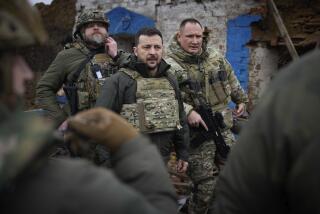In Turkey, top military figures apparently resign en masse
Reporting from Beirut ‚ÄĒ The rift between Turkey‚Äôs once-dominant military old guard and its rising Islamist political elite took a dramatic turn when nearly all the country‚Äôs military leadership apparently resigned, escalating a power struggle in a nation that plays an increasingly vital role in the Middle East.
Turkish news reports said that the army chief of general staff, Gen. Isik Kosaner, and the officers heading the Turkish ground forces, navy and air force quit Friday.
The departures appear to have come in response to further attempts by charismatic Prime Minister Recep Tayyip Erdogan to bolster civilian control over the military after the landslide election victory in June of his Islamic-rooted Justice and Development Party.
Although details of what led to the resignations were initially unclear, the two sides have been locked in a standoff over the fate of dozens of military officers jailed and on trial for allegedly plotting to overthrow the government in 2003. The military contends that the incarcerations and charges are a politically motivated attempt to break the remaining power of the secular military establishment.
More officers were indicted this week in connection with coup attempts. Analysts say the military elite has been under pressure to fire those officers who remain in jail on conspiracy charges, even though they have yet to be convicted.
The extraordinary step of mass resignations at the military‚Äôs highest echelons followed a meeting by Kosaner with Erdogan and President Abdullah Gul. Turkey‚Äôs semiofficial Anatolia news agency quoted Kosaner as writing, ‚ÄúI resign my post as I deemed it necessary.‚ÄĚ
It later rescinded the report and described the top general‚Äôs departure as a ‚Äúretirement.‚ÄĚ
There was no confirmation of the resignations by the country‚Äôs top leadership. Transportation Minister Binali Yildirim was quoted by the daily newspaper Today‚Äôs Zaman as saying ‚Äúthe state would continue to function,‚ÄĚ and saying that he had been told the officers ‚Äúhave asked for their retirement.‚ÄĚ
Some saw the generals’ move as a sign that Erdogan has prevailed in a struggle that defined Turkish politics for a generation.
‚ÄúSymbolically, it‚Äôs the end of the period of the military involvement in politics,‚ÄĚ said Asli Aydintasbas, a columnist for the daily newspaper Milliyet. ‚ÄúThey‚Äôve been politically paralyzed. This is the symbolic move in which the military is defeated entirely.‚ÄĚ
Others warned that the loss of the top brass had pushed Turkey into uncharted territory that could cause damage to both Erdogan’s political position as well as the country’s reputation.
‚ÄúFour of the five top military brass resigning from their post to protest the political authority: In any country this could create a problem,‚ÄĚ said Mensur Akgun, head of the foreign policy program at the Turkish Economic and Social Studies Foundation, a think tank in Istanbul. ‚ÄúIt can lead to a political crisis, depending on the actions of the opposition parties. They can capitalize on this issue and put pressure on the government.‚ÄĚ
But the departures clearly mark a significant moment in the trajectory of Turkey, a North Atlantic Treaty Organization member and onetime steadfast Western ally that, under Erdogan’s eight-year reign, has moved out from the shadow of nearly 80 years of domination by military figures, charting a new, more independent foreign policy.
The stability of Turkey is vital to American interests, because Washington looks to the nation as an ascendant Islamic power that could use its influence to dampen conflicts across the Middle East.
The Obama administration has recently turned to Turkey to pressure the Syrian government to ease its bloody crackdown on demonstrators. U.S. officials have sought Turkish help to stabilize post-invasion Iraq, and have tried ‚ÄĒ with less success ‚ÄĒ to foster better Turkish relations with Israel to ease Israeli-Arab frictions.
Greater strife between Turkey’s military and the civilian leadership could complicate the administration’s Middle East diplomacy.
Though the Obama and George W. Bush administrations have emphasized ties to civilian rather than military leaders in Turkey, the military remains key on a number of vital issues, including the war in Afghanistan and plans for a NATO missile-defense system to shield Europe from a possible Iranian threat.
‚ÄúIf there‚Äôs a convulsion in Turkey between the military and the civilian leadership, you can be sure that will spill over and affect the U.S.-Turkish relationship overall,‚ÄĚ said Bulent Aliriza of the Washington-based Center for Strategic and International Studies.
Some analysts said they doubted the clash would harm the country’s international reputation or ability to play a leadership role in the Middle East at this turbulent time.
‚ÄúThis is part of the normal democratization and normalization process of this country,‚ÄĚ said Cengiz Aktar, a newspaper columnist and professor of social science at Bahcesehir University in Istanbul. ‚ÄúThe military should go back to its barracks once and for all and obey the elected government of the country.‚ÄĚ
The resignations came three days before the annual Supreme Military Council meeting scheduled for Monday between top brass and the political leadership to decide on armed forces promotions to be announced later in August. There was much speculation that the direct cause of the resignations was the generals’ unwillingness to deny promotions to colleagues in jail.
According to Aktar, the military also opposed Erdogan’s attempts to inject a large degree of civilian input in the upcoming round of debate over promotions.
‚ÄúThey‚Äôre resigning because resignation is the last resort,‚ÄĚ Aydintasbas said. ‚ÄúThey don‚Äôt want to go down as the generals who failed their comrades in arms. They‚Äôre resigning because they don‚Äôt have any more leverage.‚ÄĚ
In addition to Kosaner, army commander Gen. Erdal Ceylanoglu, air force commander Gen. Hasan Aksay, and navy chief Adm. Esref Ugur Yigit also reportedly tendered their resignations, NTV television reported. Gendarmerie commander Gen. Necdet Ozel, the only commander who did not leave his post, met with Erdogan in Ankara, the capital, and was offered the position of land commander, according to the website of the Hurriyet newspaper.
The sudden departure of so many top-ranking officers also comes as tensions flare between Turkey’s armed forces and ethnic Kurdish rebels in the country’s southeast. About 20 Turkish soldiers have been killed this month by fighters of the Kurdistan Workers Party, or PKK, which since 1984 has been waging an intermittent insurgency in pursuit of autonomy.
According to Aktar, that upsurge in violence may have also contributed to the military-civilian clash. After a recent attack near the southeastern city of Diyarbakir that killed 13 Turkish soldiers, authorities launched a civilian unquiry alongside the military’s investigation, angering senior officers.
Times staff writer Paul Richter in Washington contributed to this report.
More to Read
Sign up for Essential California
The most important California stories and recommendations in your inbox every morning.
You may occasionally receive promotional content from the Los Angeles Times.










